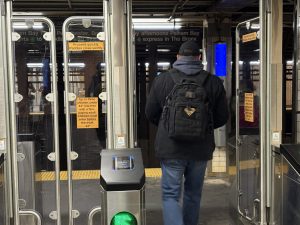While Trump battles COVID-19, voters should stay focused
October 8, 2020
On Oct. 2, President Donald Trump tested positive for COVID-19 after months of downplaying the severity of the virus. While this may temporarily backtrack his campaign, voters should not lose focus on the upcoming presidential election.
“Tonight, @FLOTUS and I tested positive for COVID-19. We will begin our quarantine and recovery process immediately. We will get through this TOGETHER!” Trump tweeted.
Before knowing he was positive for COVID-19, Trump attended several large gatherings during the week, and just 48 hours before traveled to and from Ohio, Minnesota and New Jersey.
One of those gatherings was the first presidential debate where he and former Vice President and Democratic presidential nominee Joe Biden shouted and talked over each other while socially distanced.
Following Trump’s positive test result, Biden and his wife, Jill Biden, both tested negative for COVID-19, according to his staff.
“Jill and I send our thoughts to President Trump and First Lady Melania Trump for a swift recovery. We will continue to pray for the health and safety of the president and his family,” Biden tweeted.
Trump suspended his campaign events and was hospitalized at the Walter Reed military hospital for three days.
In a video Trump posted on Twitter a day after being hospitalized, he spoke from a conference table at the hospital to reassure the nation that he was “starting to feel good.”
On the contrary, White House Chief of Staff Mark Meadows gave an update to reporters outside of the hospital on Trump’s conditions with more uncertainty for the next few days.
“The president’s vitals over the last 24 hours were very concerning and the next 48 hours will be critical in terms of his care,” Meadows said, according to The New York Times. “We’re still not on a clear path to a full recovery.”
Vice President Mike Pence, who tested negative for COVID-19 along with his wife, has taken Trump’s place in campaigning and will continue to campaign even after coming in contact with Trump.
“Anyone who has had close contact with someone with COVID-19 should stay home for 14 days after their last exposure to that person,” the Centers for Disease Control and Prevention advised the public.
Trump’s diagnosis will setback his presence in actively campaigning in a critical time with the presidential election nearby.
A poll conducted by Reuters and Ipsos after Trump said he had COVID-19 found that 65% of respondents agreed with the statement, “If President Trump had taken coronavirus more seriously, he probably would have not have been infected.”
Since the beginning of the COVID-19 pandemic, Trump has downplayed the severity of the COVID-19 pandemic, which has been the cause of death for over 200,000 Americans.
In September, The Washington Post made available audio recordings from an interview between journalist Bob Woodward and Trump from February, in which Trump acknowledges how dangerous COVID-19 is.
“You just breathe the air and that’s how it’s passed,” Trump told Woodward according to The New York Times. “And so that’s a very tricky one. That’s a very delicate one. It’s also more deadly than even your strenuous flus.”
Trump’s ignorance throughout the COVID-19 pandemic has hurt the country severely and his mocking of people following social distancing guidelines and wearing masks has caught up to him.
However, Trump supporters are still showing their support and sympathy for him, which shows that his campaign is far from over.
On Oct. 4, hundreds of Trump supporters gathered outside of Trump Towers in Manhattan.
“The supporters from Suffolk County were seen waving flags and honking horns, chanting ‘four more years,’” ABC News reported. “Their message is to stand behind President Trump and wish him a speedy recovery.”
No matter what occurs while Trump battles COVID-19, voters should continue to focus on the presidential election. This includes registering to vote, checking their registration status and planning on how they’re going to vote this year.
And, of course, continue taking the COVID-19 pandemic seriously.








